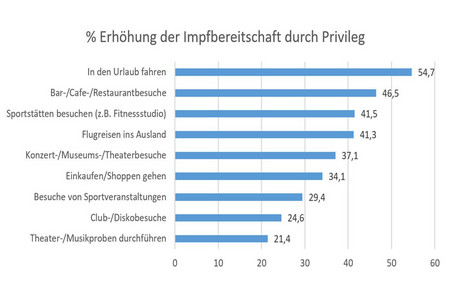Around six months after the first Corona vaccination in Germany, the national vaccination prioritisation has been lifted. Nevertheless, the topic of vaccinations remains controversial. Many questions are still open: While facing great uncertainty, how is the necessary vaccination quota to ensure "herd immunity" to be achieved? Are relaxations of anti-corona measures for vaccinated people unjust or at least legally opportune? Answers remain difficult. Given the rapid developments, well-founded data from social sciences, that can help to address the great challenges are still rare, despite daily updated statistics from R- to incidence values.
Daniel Seddig, Dina Maskileyson, and Eldad Davidov from the Institute of Sociology and Social Psychology of the University of Cologne (ISS) can contribute with the generous support of the Fritz Thyssen Foundation. Together with their colleagues Peter Schmidt (University of Giessen) and Icek Ajzen (University of Massachusetts Amherst), they conducted an online survey of 5044 citizens aged 18 to 74 in Germany in the second half of April 2021. An interim report on the study " Vaccination intentions in the COVID19 pandemic: values, institutional trust, and planned behavior. " provides more details.
19.4% of respondents had received at least one vaccination against the coronavirus at the time of the survey (between April 9 and 28 2021). The vaccination rate was highest in the 60+ age group at 29.6%. They were also ahead in terms of willingness to be vaccinated. 70.1% of them signalled an increased willingness to be vaccinated (on a seven-point scale). Among the 30 to 59-year-olds, the figure was 58.1%. Among the younger ones, only a relatively small majority (52.3%) showed a high willingness to be vaccinated.
As expected, the attitude towards vaccination has a major influence on the willingness to be vaccinated, which, according to the survey results, is strongly influenced by the social environment of the respondents. The more people associate positive consequences and benefits with a vaccination, the higher their intention to be vaccinated. In addition, 62.7% stated that they believed their closest relatives would find it "very good" if they were vaccinated. 54.5% even estimated that people in their social environment would “expect” them to get vaccinated.
The feeling of being threatened by the virus and the fear of contracting COVID-19 was widespread in all age groups. Overall, about half of the respondents - significantly more in the oldest third - feel threatened by the coronavirus and those who feel threatened are apparently more willing to get vaccinated. According to the head of the study, Daniel Seddig, the stressful experience of COVID-19 correlated "moderately" with the willingness to be vaccinated.
Incentives in the form of exemption from restrictions through pandemic control measures for vaccinated people would increase willingness to vaccinate, especially among those under 30. The strongest vaccination incentives were "going on holiday", "going to bars, cafés and restaurants" and being able to visit sports facilities such as gyms. In contrast, attending cultural events such as concerts, theatres or museums, as well as sporting events, shopping trips, club and discotheque visits, are far less attractive.
Concerning trust in vaccines, the discussions of the last few months have obviously left their mark. In terms of trust by manufacturer, there is a clear lead for Biontech/Pfizer (73.1%) ahead of Moderna (62.8%). Only just under a third (31.6%) trust Johnson and Johnson, while trust in AstraZeneca's vaccine seems even more clearly shaken. Only 25.8% have confidence in Vaxzevria (AstraZeneca‘s vaccine). The prioritisation of vaccine manufacturers and their products is then almost reflected in the willingness to be vaccinated with one of these vaccines.
Respondents also differentially assessed the measures taken so far to contain the pandemic. In April, a remarkable 53.1% of those surveyed said that these measures were still "too lax". Still, 22.7% found them "too strict". The rules, such as wearing face masks, hygiene recommendations and travel restrictions, were more or less strictly adhered to by the vast majority of respondents. The group of people under 30 adhered to the rules somewhat less strictly overall, especially in the case of contact restrictions and social distancing.
The WiSo scientists did not only examine confidence in the possible vaccines. 41.4% of the respondents agreed that the measures ordered so far to contain the Corona pandemic were in line with the interests of the general public. However, 42.7% agreed with the statement that they served the "interests of those in power". The picture is similarly divided when it comes to trust in political institutions. While 40.3% of the respondents still trusted the local administration and 38.1% their own state government, only 22.3% trusted "the politicians" in general.
Distrust of the public media also prevailed. A good fifth of the respondents even placed themselves in the lowest answer category "no trust at all". Scientific institutions, including doctors, on the other hand, enjoy good trust ratings. A good two-thirds (66.3%) trusted "science", and as many as 73.4% trusted doctors and physicians. The RKI (Robert Koch Institute) also enjoys the trust of a large majority (60.6%).
Overall, a high level of distrust in political institutions is accompanied by an increased belief in conspiracy assumptions. However, only very few respondents agreed with conspiracy assumptions regarding COVID-19. The highest level of agreement here was achieved for the statement "COVID-19 is a bioweapon developed by China to destroy the West" (11.2%). More general conspiracy assumptions, on the other hand, achieved higher approval ratings, such as "Events that at first glance appear to be unrelated are often the result of secret activities" (30.9%) or "There are secret organizations that have a great influence on political decisions" (39.2%). Belief in such conspiracy scenarios may also be associated with a lower willingness to vaccinate.
The study is scheduled to run until 2022 and is funded by the Fritz Thyssen Foundation.
